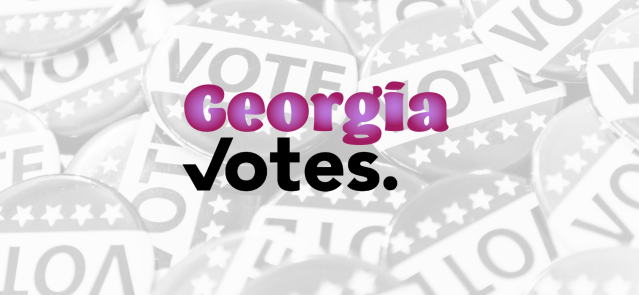Stay ahead of the curve as a political insider with deep policy analysis, daily briefings and policy-shaping tools.
Request a DemoHOPE, health care, tax breaks and the $32.4 billion budget: what’s in it for you?

Reps. Tyler Paul Smith, Spencer Frye, Al Williams and other Georgia House members are poised to celebrate Sine Die, the end of the 2023 legislation session, on March 29, 2023, by tossing up shredded and whole bills. (Credit: Jill Jordan Sieder)
The Gist
Pay raises, enriched pensions, health care services, college funds, tax breaks and more protections for consumers. These are just some of the winners in the final days of this year’s legislative session.
Of course, once a bill has been passed by the Legislature, it still must get the governor’s signature. If the governor doesn’t sign or veto it within 40 days of the end of the session, it automatically becomes law.
Here’s a look at how Georgians will benefit from new funding in the fiscal year 2023 and 2024 budgets, as well as new policies enacted through legislation that made it through both chambers this session.
What’s happening: a breakdown of the winners
- Most taxpayers will get income tax refunds ($250 for single filers, $500 for married couples) after filing their 2022 taxes this year.
- Homeowners will receive, on average, a property tax refund of about $500 later this year.
- Public school teachers and other certified school employees get a $2,000 pay raise and teachers in K-12 get a dedicated planning period during school hours when they can’t be required to do paperwork or other duties.
- Pre-K teachers and assistant teachers will get a $2,000 increase from lottery funds.
- Public school nurses, nutrition workers and bus drivers get a 5.1% pay raise, and school custodians get a $1,000 bonus.
- Children enrolled in kindergarten through third grade will benefit from new reading and literacy programs outlined in the Georgia Early Literacy Act, which mandates that schools use high-quality, evidence-based reading curricula and literacy tools, and requires teachers to receive training on how to provide developmentally appropriate literacy instruction.
- Funding was restored to the program that provides reduced-priced lunches to public school children in need.
- Middle and high school girls attending school in low-wealth areas who need feminine hygiene products will be able to get free tampons and pads at school.
- College students who qualify for the HOPE scholarship will receive 100% of tuition next year, including those enrolled in public and private colleges. Students at state universities and technical colleges who don’t have the money to graduate will benefit from $12 million in lottery funding for the state’s need-based completion grants program, now offering $3,500 once students have completed 70% of credits in a four-year program, and 45% of credits in a two-year program.
- Students with intellectual disabilities can now get 100% of their college tuition covered and can expect to be enrolled in classes with nondisabled peers for at least 50% of their courses. SB 246 also ensures that these students will get individual support and services for social inclusion, including involvement in extracurricular activities.
- People with a multitude of behavioral health needs will find more services and care available through $27 million in funding for three new behavioral crisis centers in Augusta, Dublin and Fulton County, as well as expanded services for substance abuse and addiction recovery across the state.
- The 2024 budget includes $9.4 million to double the number of waivers funding care for people with intellectual and developmental disabilities.
- Adults on Medicaid will now have dental coverage.
- Health care providers in rural areas will qualify for loan repayment programs, including rural doctors, physician assistants, advanced practice registered nurses and new mental health professionals.
- Nurses who serve as faculty members in post-secondary nursing programs will be eligible to have up to $100,000 of their student loans repaid by the state, per SB 246.
- People who enroll in eligible programs of study in the behavioral health professions will qualify for service-cancelable loans, funded by $10 million provided to the Georgia Student Finance Commission, per HB 1013, the 2022 Mental Health Parity Act.
- State psychiatric hospital employees will get salary increases through a $10.1 million appropriation to the Department of Behavioral Health and Developmental Disabilities, a budget move to address part of the workforce crisis at the department.
- More low-income families will receive child care assistance through $1 million in matching funds for the Department of Early Care and Learning, to draw down another $1 million in federal funds.
- Children with complex physical, mental and behavioral health needs who are in the care of the Department of Family and Children Services (DFCS), living in foster homes, hotels, or DFCS offices, will find better housing options and support through $20.2 million in new state funding.
- The passage of SB 133 means that juvenile court judges will have to take a beat before sending children who have been reportedly abused or neglected into state custody or foster care. The new law requires judges to let DFCS gather and review information about the child’s case and options for where to place them (including with extended family) before removing them from their homes.
- More than 3,900 law enforcement officers in a dozen state agencies will get a $4,000 pay increase in 2024, and some frontline officers, including state troopers and Georgia Bureau of Investigation (GBI) officers, will receive an additional $2,000.
- Families of cold-case victims, including some involved in 600 known existing unsolved cases, can now ask law enforcement agencies to renew a probe into old cases after three years. The 2024 budget provides $5.4 million for a new cold case unit within the Georgia Bureau of Investigation.
- Law enforcement dogs are getting some legal protection. Anyone who harms a K-9 officer or search and rescue animal on duty could now face up to a year in jail and/or $1,000 in fines, thanks to SB 155 aka “Figo’s Law,” named for the Georgia State Patrol K-9 killed in the line of duty last October.
- Buckhead residents will get more peace of mind when the Department of Public Safety opens a $1.25 million satellite post in the north Atlanta area where citizens have complained about incidents of violent and property crime.
What about other government workers?
- All state employees will receive a $2,000 cost of living raise.
- Retired state employees will receive a bump in their pensions and a one-time benefit of $500.
- Employees at the Georgia Forestry Commission will get a $4,000 pay raise on top of the $2,000 increase provided to all state employees.
And there’s more …
- Drivers of electric vehicles will now be able to pay for juicing up their vehicles by the amount of power used instead of the amount of time spent at a charging station, with some new taxes added, per SB 146.
- People who use gas-powered leaf blowers can blow leaves to their heart’s content because the state has barred any localities from banning the devices. HB 374 also prohibits cities and counties from telling homeowners what fuel they can use in their homes, including in their stoves.
- People with online subscriptions, such as Netflix, will now be able to opt out of or cancel automatic renewals online with businesses that offer paid subscriptions or purchasing agreements.
- And people who order food from third-party food delivery services such as GrubHub or UberEats can take comfort in knowing that the food and business practices of those apps, including their dealings with local restaurants, will be better regulated. In both cases, terms between consumers and online merchants must be “clear and conspicuous” to reduce deceptive and unfair trade practices.
What’s Next
Gov. Brian Kemp will sign, ignore or veto the FY 2024 budget and the bills passed by the General Assembly in 2023 that still await his review. Bills not vetoed within 40 days will become law. Legislators can override a veto with votes by at least two-thirds of the members of each chamber. Bills tabled or never taken up by either chamber this year, as well as wholly new legislation, will have a fresh shot at consideration on Jan. 8, 2024, when the second year of this two-year legislative session begins. Before the start of the 2024 session, the governor will submit a budget report including his proposed amendments to the Fiscal Year 2024 budget, as well as his proposed FY 2025 budget. The fiscal year in Georgia begins July 1.
Have questions, comments or tips about legislation that did or didn’t pass this session, and thoughts about what should be on the legislative agenda for 2024? Contact Jill Jordan Sieder on Twitter @journalistajill or at [email protected] and Tammy Joyner on Twitter @lvjoyner or at [email protected].
Twitter @STATEAFFAIRSGA
Facebook @STATEAFFAIRSUS
Instagram @STATEAFFAIRSGA
LinkedIn @STATEAFFAIRS
Header image: Reps. Tyler Paul Smith, Spencer Frye, Al Williams and other Georgia House members are poised to celebrate the end of the 2023 legislation session on March 29, 2023, by tossing up shredded and whole bills. (Credit: Jill Jordan Sieder)
Over 2.6M Georgians have already voted in next month’s election
CLAYTON, GA — Georgians this week continued their brisk pace to the polls with nearly 4 in 10 of the state’s active voters having cast ballots in person or by mail by late afternoon Friday. All told, over 2.6 million Georgians — or 36.2% — have cast ballots since early voting began Oct. 15, according …
Party on: Lt. Gov. Burt Jones rallies Republicans in the final stretch
You’ll have to forgive Burt Jones if he’s a bit tired. The state’s second-in-command has been keeping late hours in the final weeks leading to the Nov. 5 general election. The lieutenant governor spent most of Wednesday squiring Republican presidential candidate Donald Trump to a town hall in Zebulon and a gathering in Duluth that …
Madeline Ryan Smith keeps it local as she aims to unseat incumbent in Georgia House District 158
Editor’s note: State Affairs spoke with the four Gen Z candidates running for the state Legislature in November as part of our “On the CampaignTrail” series. They discussed their campaigns and what they plan to do if elected. This profile looks at Georgia House District 158 candidate Madeline Ryan Smith. To read the main story …
A primer on the Nov. 5 ballot measures: What you need to know
In addition to voting for president and down-ballot candidates in the Nov. 5 election, Georgians will decide on a couple of tax measures and whether to create a statewide tax court. Three questions call for a statewide vote, all of which appear at the end of the ballot. The first time most voters see these …



